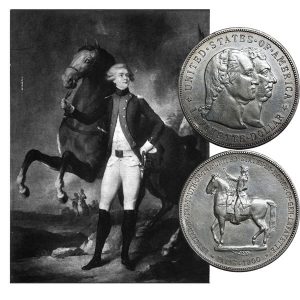Today, the Lafayette Commemorative Silver Dollar Coin remembers when Congress finally agreed to accept the gentleman into the revolutionary army on July 31, 1777.
From the periodical “The Mentor” of January 15, 1918:
=====
Lafayette’s reception by Congress was not as enthusiastic as it might have been. The reason for this was that the American Government was continually bothered by foreigners seeking commissions of high rank in the army.
Another thing was that they rather doubted that anyone of Lafayette’s age could accomplish much. They did not know the youth.
At last Lafayette wrote a letter to Congress, part of which said: “After the sacrifices that I have made in this cause, I have the right to ask two favors at your hands; one is that I may serve without pay, at my own expense; and the other is that I may be allowed to serve at first as a volunteer.”
This changed matters, and on July 31, 1777, Congress passed a resolution accepting Lafayette’s services, and “in consideration of his zeal, illustrious family and connections,” gave him the rank of Major General in the army of the United States.
A day or so after this, Lafayette met General George Washington for the first time at a military dinner given in Philadelphia. This was a momentous occasion for the young Frenchman; for he now saw face to face the man whom he was to follow devotedly for years, and for whom he was to have the greatest admiration throughout his entire life.
Washington, on his part, read Lafayette’s character correctly, and judged rightly that the young man would prove of great value. He invited him to be on his staff, an offer which Lafayette delightedly accepted.
Lafayette’s military career in the United States, while very creditable, was not especially noteworthy. He served bravely and well, but his actual military value to the colonies was not nearly so great as the moral value of his courageous and sympathetic spirit.
At the time he came to America, the American army was one only in name. It was small, badly drilled, and uniformed in rags.
Lafayette, however, saw everything in the best light. When General Washington apologized for the deficiencies of his little army and suggested that Lafayette must notice a difference between it and those of Europe, the young Frenchman answered that he had come to America to learn, not to teach.
This was typical of Lafayette. He was always the courteous gentleman.
Lafayette’s first battle in the Revolution was Brandywine, on September 11, 1777. The American troops were defeated, but Lafayette showed great courage.
When he saw the Revolutionists were retreating in panic, he plunged into their midst and endeavored to make the men turn and take a stand against the enemy. The odds were too great, however, and the retirement had to be continued.
In the midst of the battle Lafayette received a musket ball in his left leg, just below the knee. He insisted on remaining with the troops until he became too weak to go further.
Finally Washington made him give himself into the hands of the surgeons. When the doctors expressed fear for his safety, Lafayette looked at the wound and cried: “Never mind, gentlemen; I would not take fifteen hundred guineas for that.”
When he got back to Philadelphia, Lafayette wrote immediately to his wife so that she might not worry concerning his safety.
“It was a mere trifle,” he wrote. “All I fear is that you should not have received my letter. As General Howe is giving in the meantime rather pompous details of his American exploits to the king his master, if he should write that I am wounded, he may also write word that I am killed, which would not cost him anything; but I hope that my friends, and you especially, will not give faith to reports of those persons who last year dared to publish that General Washington and all the general officers of his army, being in a boat together, had been upset and every individual drowned.”
After he recovered from his wound, Lafayette received command of a detachment of 300 men. In this command he showed great skill; and Washington secured for him the command of a division.
In a letter written on November 1, 1777, the American general advocated this: “The Marquis de La Fayette is extremely solicitous of having a command equal to his rank. I do not know in what light Congress will view the matter, but it appears to me, from a consideration of his illustrious and important connections, the attachment which he has manifested for our cause, and the consequences which his return in disgust might produce, that it will be advisable to gratify his wishes, and the more so as several gentlemen from France who came over under some assurances have gone back disappointed in their expectations. His conduct with respect to them stands in a favorable point of view—having interested himself to remove their uneasiness and urged the impropriety of their making any unfavorable representations upon their arrival at home. Besides, he is sensible, discreet in his manners, has made great proficiency in our language, and from the disposition he disclosed at the battle of Brandywine possesses a large share of bravery and military ardor.”
On December 20th Lafayette received the joyful news that he was the father of a second daughter. The whole American camp joined with him in rejoicing, for the young Frenchman was a favorite.
=====
The Lafayette Commemorative Silver Dollar Coin shows with an image of the man as a young Major-General standing by his rearing horse.
